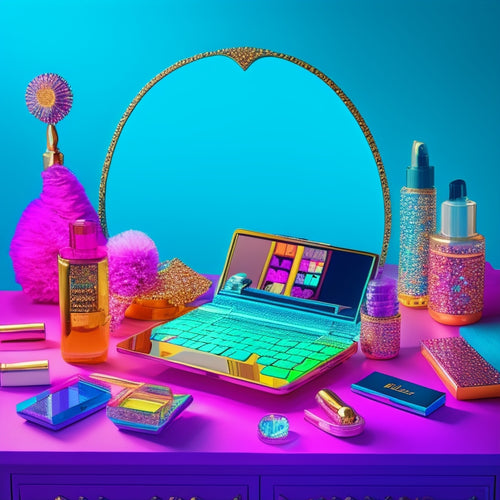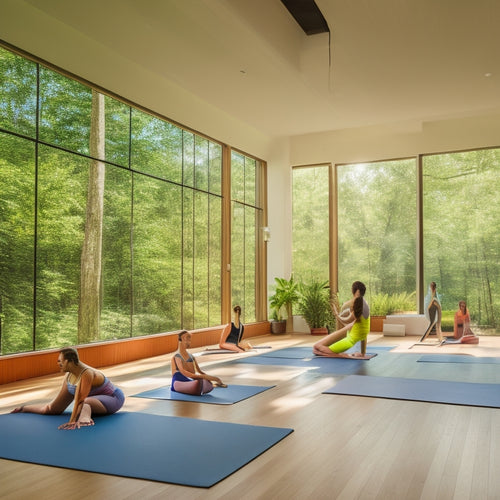
Mastering the Art: Key Makeup Artist Essentials
Share
A successful makeup artist supports the makeup department head, achieves desired looks on talent, and collaborates with the team to ensure flawless execution. Key to success are attention to detail, adaptability, and a strong professional network. To thrive, artists must think on their feet, troubleshoot, and problem-solve. A deliberate career plan, strategic networking, and pursuit of excellence are essential for building a successful career. Staying abreast of trends and continuously updating skills and knowledge are vital. By mastering these essentials, artists can open up their full creative potential and propel their careers forward, and discover the secrets to achieving makeup mastery.
Key Takeaways
• Possess attention to detail to achieve precise makeup looks and ensure continuity throughout production.
• Develop a strong professional network to access new projects, collaborations, and mentorship opportunities.
• Stay updated on industry trends to propel your career forward and maintain relevance.
• Master problem-solving skills to think on your feet and adapt to fast-paced environments.
• Build a strong portfolio to showcase your skills and attract new clients and projects.
Key Makeup Artist Roles
As the right-hand person to the makeup department head, an essential makeup artist assumes a multi-faceted role that encompasses a range of responsibilities, from supporting the department to achieving makeup looks on talent.
Day-to-day tasks involve collaboration with the department head, managing clerical work, and tracking continuity to guarantee a seamless production.
Additionally, the essential makeup artist plays a critical role in department dynamics, fostering a positive and productive environment through effective communication and teamwork.
On set, they interact with other departments, such as costume and hair, to guarantee a cohesive visual aesthetic.
Essential Skills and Qualities
To excel in the role of a key makeup artist, one must possess a unique combination of skills and qualities that enable effective collaboration, attention to detail, and adaptability in a fast-paced environment. A strong foundation in makeup techniques is essential, but it's equally important to have industry connections that can open up new opportunities.
Self-promotion is pivotal, and networking opportunities should be seized to build a strong professional network. A key makeup artist must be able to think on their feet, troubleshoot, and problem-solve while maintaining a calm and professional demeanor.
Building a Successful Career
A key makeup artist's career trajectory is often shaped by a combination of deliberate planning, strategic networking, and a relentless pursuit of excellence in their craft.
To achieve career advancement, it is essential to stay abreast of industry trends, continuously updating skills and knowledge to remain relevant.
Building a strong portfolio that showcases versatility and expertise is essential, as it serves as a visual representation of one's capabilities.
Networking is also crucial, as it provides opportunities for collaboration, mentorship, and access to new projects.
Frequently Asked Questions
How Do I Organize My Kit Box for Efficient Use on Set?
"To optimize kit box efficiency, categorize products by type and frequency of use, prioritize quick touch-up essentials, and strategically place most-used items for easy access, ensuring seamless time management and minimizing delays during shoots."
What's the Average Number of Talent I'll Work With Daily?
'In a fast-paced production environment, a Key Makeup Artist can expect to work with 5-10 talents daily, demanding exceptional time management, multitasking, and talent interaction skills to guarantee client satisfaction and flawless makeup looks under pressure.'
Can I Specialize in a Specific Makeup Area, Like Special Effects?
As a Key Makeup Artist, you can specialize in specific areas like special effects, creating fantasy looks, or focus on horror makeup, mastering prosthetic applications, and building a niche expertise to elevate your career and reputation in the industry.
How Many Hours of Sleep Can I Expect on a Typical Shoot Day?
"Burning the midnight oil" is a reality for makeup artists, who can expect 4-6 hours of sleep on a typical shoot day, with rest time fragmented and dependent on the production's demanding schedule and tight deadlines.
Do I Need to Bring My Own Makeup Products to Each Production?
As a Key Makeup Artist, discussing product needs with production beforehand is crucial, taking into account factors such as product hygiene, sustainability, budgeting, and client preferences, to determine the necessity of bringing personal makeup products to each set.
Related Posts
-

What Inspires Your Dance Makeup Looks Online?
Your online dance makeup looks are shaped by a dynamic mix of YouTube tutorials, Instagram inspiration, expert advice...
-

Essential Spandex Shorts for Yoga and Pilates
Essential spandex shorts are vital for your yoga and Pilates practice. Look for moisture-wicking technology to keep y...
-

Dance Audition Essentials: Must-Haves for Success
You're about to take your dance audition to the next level by focusing on the essentials that'll give you an edge. St...


